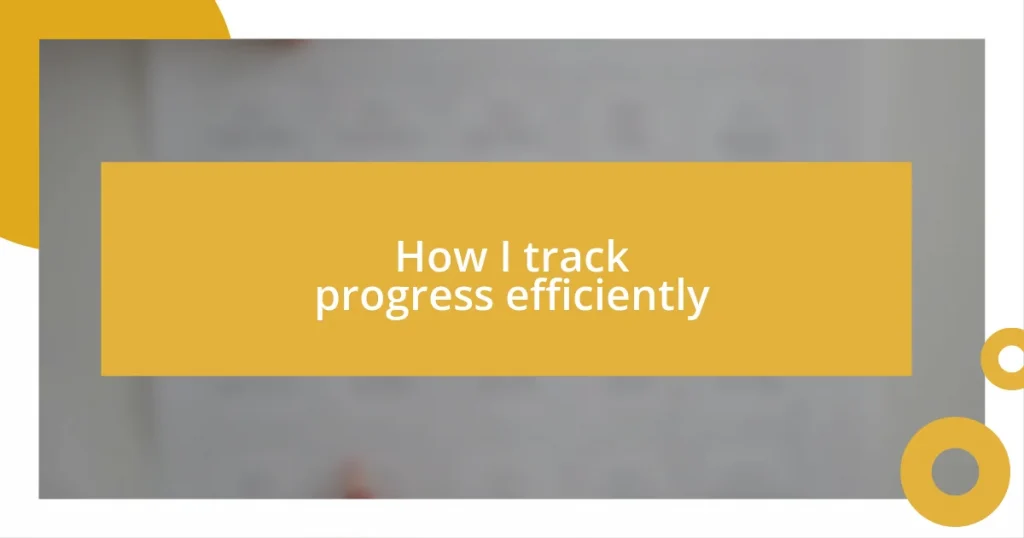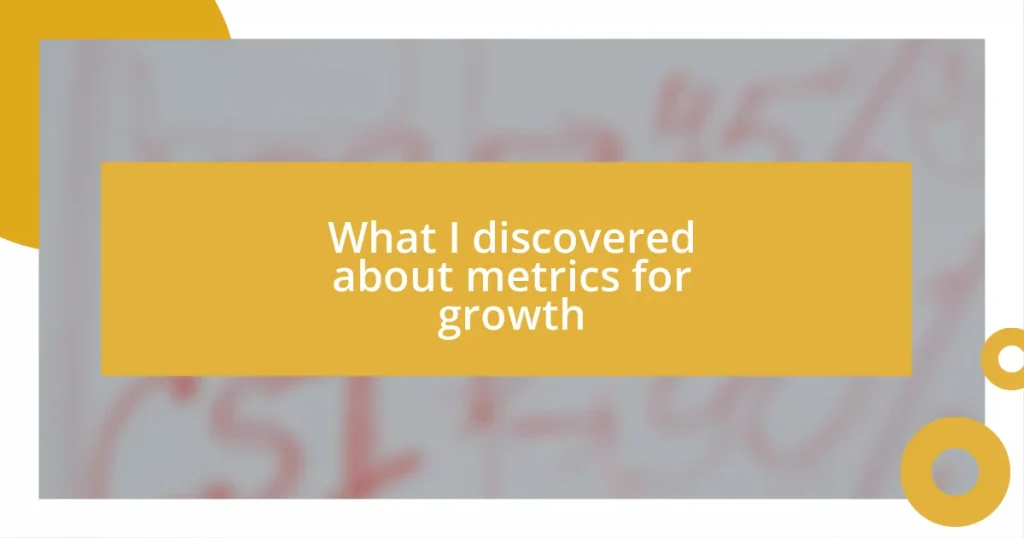Key takeaways:
- Clearly defined SMART goals (Specific, Measurable, Achievable, Relevant, Time-bound) provide direction and motivation for tracking progress.
- Choosing relevant, simple, and actionable metrics ensures effective tracking and keeps focus on what truly matters.
- Regularly analyzing progress and celebrating small milestones fosters reflection, motivation, and a sense of accomplishment in achieving larger goals.

Understanding your goals
Understanding your goals is a crucial first step in any tracking process. When I embarked on my fitness journey, I realized that without clearly defined objectives, my motivation was a bit like a sailboat without wind—just sitting there, going nowhere. Have you ever set out to achieve something, only to find yourself lost halfway? Identifying what you truly want can give you the direction you need.
I learned that it’s not just about setting any goal; it’s about making them SMART: Specific, Measurable, Achievable, Relevant, and Time-bound. For instance, saying “I want to get fit” lacks clarity. Instead, when I reframed my goal to “I want to run a 5k in three months,” everything shifted. I had a target date and a measurable outcome, which added a spark to my enthusiasm. What are your goals, and how can you refine them for better tracking?
In my experience, regularly revisiting and reevaluating my goals has proven invaluable. It’s easy to get caught up in the hustle, yet I find that taking a moment to check in with my initial objectives helps me stay grounded. It makes me question, “Am I still aligned with what I set out to do?” This sense of reflection not only keeps my progress in check but also reignites my passion for what I am pursuing. Have you done the same lately?

Choosing the right metrics
Choosing the right metrics is a pivotal part of tracking progress effectively. In my experience, metrics should resonate with your goals, providing tangible evidence of your advancement. I remember when I first started monitoring my writing productivity; I was tempted to track everything from word count to pages read. Eventually, I learned that focusing on fewer, more meaningful metrics—like the number of completed drafts or feedback received—made my tracking more purposeful.
When selecting metrics, it’s essential to consider the following factors:
– Relevance: Ensure the metrics align closely with your goals, avoiding distractions.
– Simplicity: Choose metrics that are straightforward and easy to interpret at a glance.
– Actionability: Opt for metrics that can guide your next steps, whether that’s adjusting strategies or celebrating successes.
– Time-frame: Consider how often you want to assess your progress—daily, weekly, or monthly—and choose metrics that fit that schedule.
Reflecting on this process has taught me that the metrics I choose are a reflection of what I genuinely value. If I find myself measuring something just because it’s popular or trending, I’m unlikely to stay committed. I encourage you to think about what truly matters to you and let that guide your metric selection.

Setting up tracking systems
Setting up an effective tracking system is essential for keeping tabs on your goals. When I first set out to create my own system, I realized the importance of choosing the right tools. From simple apps to sophisticated software, the options are vast. I personally gravitate towards user-friendly apps that allow me to visualize my progress, such as charts or graphs. They create a sense of accomplishment every time I see those numbers climb!
Another key aspect is maintaining consistency. I’ve found that dedicating a specific time each week to review my progress keeps me accountable. Whether it’s Sunday mornings with a cup of coffee or a mid-week check-in, I embrace this ritual. It helps me to not only update my tracking but also reflect on what’s working and where I need to shift my focus. Have you thought about how you can weave tracking into your routine?
Finally, integration is vital. I’ve learned that incorporating my tracking system with other tools I use, like calendars or project management software, streamlines my efforts. For example, I link my task list with my fitness app, ensuring that my personal goals fit seamlessly into my daily life. This holistic approach minimizes duplication and maximizes efficiency, making it easier to stay on track and motivated.
| Tracking System | Pros |
|---|---|
| User-Friendly Apps | Visual representation of progress, intuitive interface. |
| Spreadsheets | Highly customizable, detailed data analysis. |
| Project Management Software | Integrates tasks and tracking, team collaboration features. |

Utilizing apps and tools
When it comes to utilizing apps and tools effectively, I’ve discovered the power of personalization. For instance, I once downloaded several highly-rated productivity apps, only to find that they overwhelmed me with features I didn’t need. Eventually, I settled on a minimalistic app that only tracks my writing time and word count. This simplicity not only keeps me focused but also prevents me from getting lost in complexity. Have you found an app that feels just right for your needs?
I’ve also seen the incredible value in combining different tools, like using habit trackers alongside goal-setting apps. For example, I used to jot down my daily writing goals in one app, but once I integrated it with a habit tracker, the results skyrocketed. Each tick on my habit tracker served as a mini-celebration, reinforcing my commitment. It’s fascinating how small interactions can have a significant impact on your motivation, isn’t it?
Lastly, I can’t emphasize enough the joy of gamifying your progress. I remember the excitement I felt when I started using an app that introduced levels and rewards for achieving my goals. Not only did it make tracking more fun, but it also fostered a sense of competition with myself. By transforming mundane tasks into challenges, I stayed engaged and driven. Have you thought about how a little fun could transform your tracking experience?

Analyzing progress regularly
I’ve come to realize that regularly analyzing my progress is like hitting the refresh button on my goals. For instance, during one of my weekly reviews, I discovered that I had been allocating too much time to tasks that didn’t align with my main objectives. It hit me hard, and I felt a mix of frustration and determination. That moment propelled me to adjust my focus for the upcoming week. Have you ever felt that spark when reassessing your direction?
Incorporating a straightforward checklist during my analysis sessions has also proven invaluable. I jot down what went well and what didn’t, creating a mini report of sorts. This not only keeps my insights organized but also provides clarity on my mental state as I track my emotions alongside my achievements. Reflecting on those emotional highs and lows helps me stay grounded. Are you tracking your feelings as well as your tasks?
Furthermore, I often find it helpful to seek feedback from others during these regular analyses. One time, I shared my progress with a mentor who provided constructive criticism that shifted my entire perspective. Hearing an outsider’s viewpoint can shine a light on blind spots I might have missed. It transformed my approach and made me realize the importance of collaboration in my growth process. Have you considered involving others in your progress checks?

Adjusting strategies based on feedback
Adjusting my strategies based on feedback has often been a game-changer for me. I remember a time when I was struggling with a project’s direction, and after sharing my progress with a trusted colleague, their perspective opened my eyes. They pointed out areas of strength I hadn’t considered and suggested tweaks that felt manageable. It was a lightbulb moment for me—why struggle in silence when a fresh set of eyes could make such a difference? Have you ever sought feedback and found that it completely reframed your thinking?
In another instance, I created a draft I was quite proud of, but after sharing it with my writing group, I quickly recognized its flaws. Their critiques were tough to swallow initially but resulted in significant improvements. I learned that feedback doesn’t have to be about hitting the mark every time; sometimes, it’s about uncovering the layers that need adjusting. Do you give yourself space to receive constructive criticism, or do you shy away from it thinking it might undermine your confidence?
I also find that reflecting on the feedback I receive helps me create a more tailored approach. After a candid conversation with my mentor, I started maintaining a feedback journal to track suggestions and my subsequent adjustments. This practice not only clarifies my thought process but also highlights my growth over time. It’s fascinating to see changes sparked by feedback manifesting into meaningful progress. How do you keep track of the wisdom shared with you, and does it influence your strategy adjustments?

Celebrating small milestones
Celebrating small milestones is a practice I’ve found incredibly refreshing in my journey toward achieving larger goals. For example, when I completed the first draft of a project I was passionate about, I decided to take myself out for coffee. That moment of indulgence felt like a reward, not just for finishing a draft but for the perseverance it took to get there. Have you ever treated yourself after reaching a mini-goal? It truly amplifies the satisfaction.
I also like to share my small victories with friends or family. Recently, I finished a significant section of a lengthy report, and I couldn’t wait to tell my partner about it. Their excitement and encouragement made me feel validated and motivated to push further. When we verbalize our successes, it becomes a collective celebration that strengthens our resolve. Have you considered how sharing your achievements can deepen your support network?
Moreover, I often keep a visual progress tracker, and every time I hit a small milestone, I mark it with a fun sticker or a colorful pen. This simple act adds a bit of joy to my routine and makes progress tangible. There’s something satisfying about looking at that chart and seeing the visual representation of my hard work. What little things can you incorporate into your tracking to make it feel more rewarding? Every celebration, no matter how small, builds momentum and keeps me engaged in the journey.















